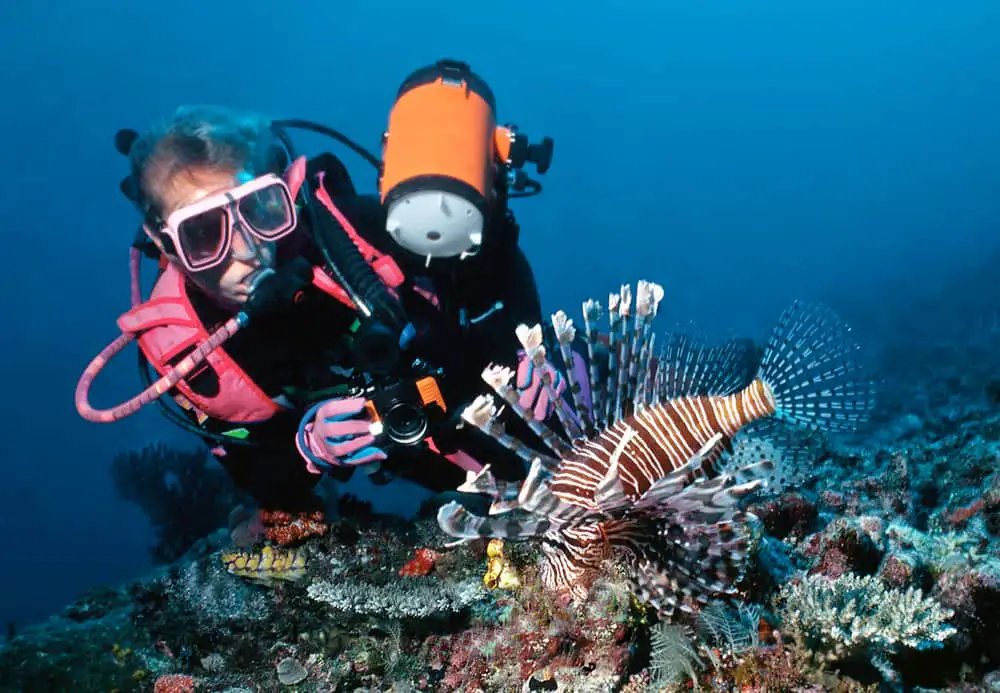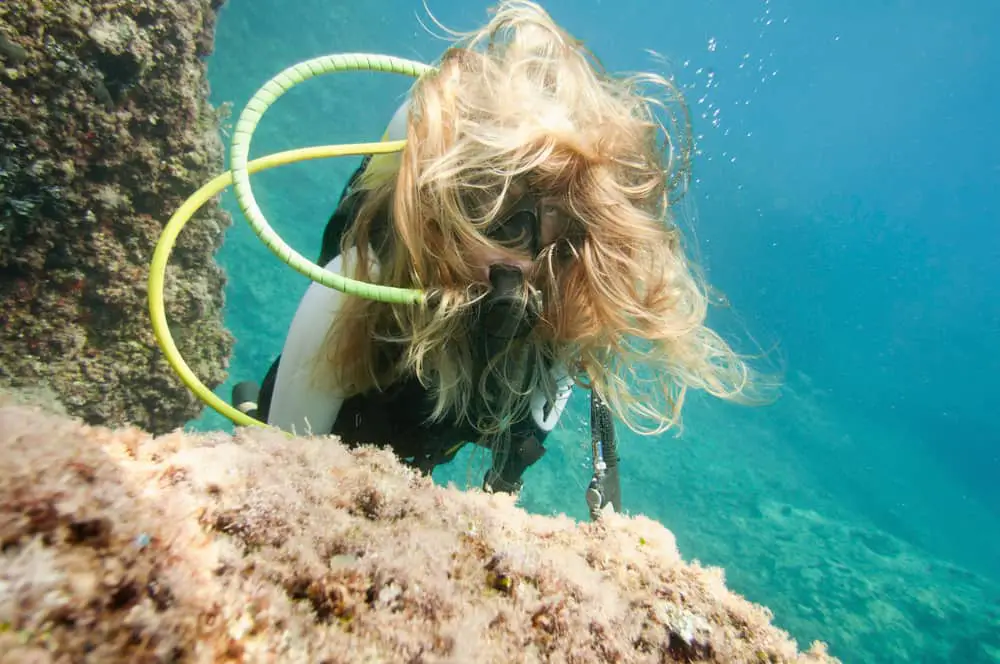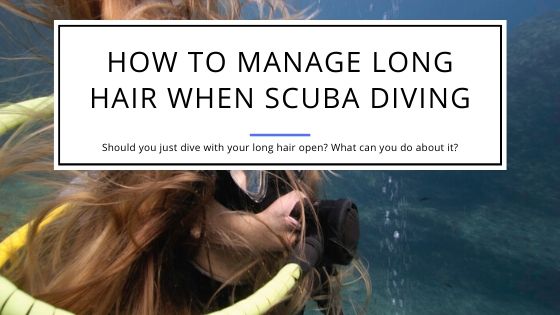How to Manage Long Hair When Scuba Diving
Long locks on surfer dudes and beach waves on babes are often stereotypical looks for water junkies, but have you ever thought about the work that goes into managing the hair underwater? It may be easier for surfers, but when it comes to diving, long hair can be a bit of a task to handle.
Long, flowing hair on land looks gorgeous, but imagine the same flowing hair as you’re trying to swim with a mask and other gear on. That sounds pretty disruptive, messy and dangerous, doesn’t it?
Not only is it a problem during the dive, but it can also be quite a matted mess once you’re out of the water! Below we will discuss all the reasons why long hair can be an issue while diving, and what you can do about it:
Why Can Long Hair Be A Problem When You Dive?
Divers don’t purely exist underwater; they like to come up on land and live in the real world, where they want to look their best. For some, that means growing out their hair long, but what does that mean for their dives?
Long hair can be troublesome when diving because it can obstruct your view by floating into your field of vision, but that’s the least of your problems. Hair has a tendency to get caught in masks, which can cause a leak and be very inconvenient.
If your hair gets caught in the rubber strap, taking off the mask can be painful. Divers often end up ripping out strands of hair as they get free from the mask. If your hair is long enough and open, it can possibly even get caught in the first stage of your regulator. This can cause stress underwater and be potentially dangerous.
But these aren’t the end of your problems! Probably, the worst of all is actually emerging from the water with a tangled, matted mess upon your head that will have you running the other way from your hairbrush. Saltwater tends to dry out hair and when it’s floating around freely, it gets tangled up!
What to Do with Your Hair When You Go Scuba Diving?
You need to find a way to keep your hair out of the way while diving. The best way to do that is to tie it up! You can use a few different methods to do that, which we will discuss below, but the main point is to keep it securely out of the way.
However you choose to tie your hair, just make sure that it doesn’t have the potential to get loose and float around. A good tip to protect your hair and also make sure it stays in place is to use coconut oil before you tie it up; no stray hairs will get away!
Finally, there is some specific gear that you can use to keep hair in one place and avoid it getting tangled in other gear, which we will also discuss below.
How Should You Wear Your Hair When Scuba Diving?
If you are choosing to tie your hair up, here are a few styles that are effectively used by divers:
French Braid
This style is used for longer hair, usually cut in layers. The technique helps secure each layer into the plait individually, making sure it doesn’t move during the dive. A French braid can be made singularly or double depending on preference.
Pigtails
Pigtails are also used on longer hair to secure it in place but are preferable for one-length hair or long layers. These require you to make simple three-strand braids on either side of the head; your hair won’t get tangled in your gear, but it will move around a little.
Ponytail
Ponytails are effective for mid-length to shoulder-length hair. If you have longer hair, down to your waist, the loose hair at the end of the ponytail will get tangled in your gear.
Low or High Bun
This works for any length of hair as long as it is secured properly. Buns may get loose so make sure you have tied it tightly into place. The reason why mid-height buns don’t work is that they come in the way of mask straps.

Other Tips for Long Hair If You Dive
If you dive often, hair care is very important. You should look into investing in some UV protection leave-in conditioner and coconut oil to nourish your hair. The sun and salt in water are both very damaging to your locks.
Use a generous amount of either the conditioner or oil on your hair to create a barrier when you go for your dive. If you choose the conditioner, make sure it is ocean-safe and biodegradable so you don’t harm the marine life around you.
Another practice you should make a habit pre and post-dive is to rinse your hair with fresh water. Pre-dive, do it before applying the oil or conditioner to add an additional protective layer. Post-dive, do it to rinse out any salt or debris that has made its way into your hair.
To brush your hair, get a wide-toothed comb or detangler brush so you don’t further damage your hair. Sun damage and salt can make your hair dry and brittle; you want to use brushes and combs specifically designed to reduce breakage.
Should You Wear A Hood While Scuba Diving with Long Hair?
If you really want to protect your hair and don’t want the hassle of going through all the steps of special care, a hood is a way to go. Not only is it going to protect your hair, but it is also the most effective way to keep your hair contained.
Hoods can be purchased in many forms, so you can buy one according to your needs. They can be beanies, ones that cover your head and strap under the chin, full hoods that even cover your neck, all the way down to hooded vests that can be worn on top of your wetsuit.
Can You Wear A Dive Bandana or Headband?
Bandanas and headbands are a great way to keep shorter hair and bangs out of your way while diving. These fun accessories can be purchased in thick and thin materials of all colors and designs. They can add a splash of color to your gear, and are an effective way of keeping short layers and hair off your face. For longer hair though, consider tying up the rest of it to avoid any mess.
If you feel you have appropriately tied up your hair and it is still somehow being pulled by your rubber mask strap, you can get yourself a strap cover. Mask strap covers are made of neoprene, which won’t tug on your hair!

Should You Just Cut Your Hair?
Sure, cutting your hair is the best way to keep it out of the way. If you are that committed to diving, maybe this is the best option for you. Haircare and styling can take up loads of time and require some level of skill, so cutting it isn’t the worst option.
For those who want to keep their mane long though, there are many options out there, many of which we have discussed; so don’t worry, you can keep the long hair, you just need to invest some time and energy into it.
Final Thoughts
Don’t let diving get rid of your passion for keeping your long hair. Just remember to care for it well and keep it out of the way during dives!

